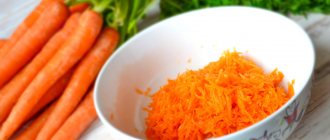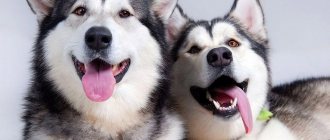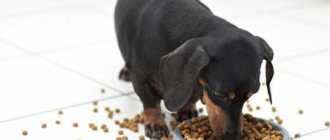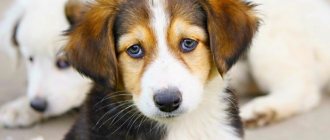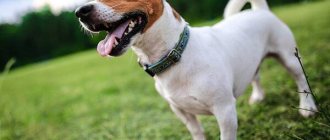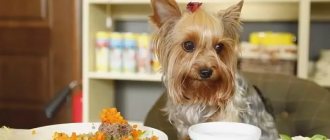German Shepherds are strong, tough and resilient animals. But dogs of this breed have a weak digestive system and are prone to stomach diseases, diarrhea and constipation. How and what to feed shepherd dogs at home, from a young age to old age, how much food to give dogs per day, and what rules should be followed when feeding them?
General information about feeding your German Shepherd
Different types of nutrients do different jobs: proteins are used for growth and development, maintaining the dog’s muscle tone, carbohydrates and fats for energy, vitamins and minerals for maintaining tone, activity and health. The dog gets both from natural food and from dry food (super premium class and higher).
Overfeeding German Shepherds is just as harmful as feeding them inferior food. This leads to obesity and atherosclerosis. Increase portions in winter, with increased physical activity, for pregnant bitches; reduce for sedentary, old, sick dogs and in the summer. Monitor your dog's appetite and health. Playing immediately after feeding leads to volvulus (the stomach is very loosely “suspended”) of the intestines, so walk the dog before feeding.
Photo: pixabay.com
Prohibited Products
In terms of food, shepherds are unpretentious dogs, but some foods can be dangerous to their health.
- Sugar, sweets, raisins and grapes. Sweets, cookies, chocolate and other sugar-containing treats damage teeth and cause obesity and diabetes.
- Milk – causes diarrhea and interferes with calcium absorption.
- Raw fish can cause infections and parasites.
- Mayonnaise, ketchup, mustard, vinegar, etc.
- Fried foods can lead to obesity.
- Citrus fruits are often the cause of allergies.
- Plums and peaches cause indigestion.
- Avocado. Many animals like its taste. But this source of healthy fats can be harmful to your pet's health. Persin is a toxin, a few grams of which cause stomach upset and vomiting.
- Walnuts and almonds. Dogs are unable to digest nuts (with the exception of pine nuts and peanuts). In addition, almonds contain toxic acid that can cause acute poisoning.
Feeding dry food
Dry food is convenient at home and does not require time-consuming preparation or effort to balance nutrients. But they are expensive, even economy class “drying”, which requires much more than super premium to saturate the dog. In addition to cheap food, you will also have to buy vitamins.
Feed your shepherd dry food twice a day.
Determine the daily serving size according to the table on the package. Table 1. Feeding the German Shepherd with food
| Index | Premium | Super premium |
| Daily serving size, g | 700-750 | 500-600 |
| Nutritional content, kcal/100 g | 300-350 | 350-400 |
| Digestibility, % | up to 75 | 90-97 |
| Balance | Needs vitamins, not suitable for sensitive dogs | balanced, especially specialized for the breed |
| Type of cereals | often unsuitable for "Germans" | corn (harmless for shepherds) |
The best dry food
| Type of feed | Class | Calorie content, kcal/100 g | Animal products, % (types) | Carbohydrates (cereals) |
| Duke's Farm Adult Large | super premium | 362 |
| rice, oats, barley, corn |
| Type of feed | Class | Calorie content, kcal/100 g | Animal products, % (types) | Carbohydrates (cereals) |
| Hill's Science Plan Canine Adult Advanced Fitness Large | super premium | 373 |
| rice, wheat, barley, sorghum, corn |
| Type of feed | Class | Calorie content, kcal/100 g | Animal products, % (types) | Carbohydrates (cereals) |
| Profine Adult Large Chicken&Potatoes | super premium | 370 |
| potatoes, corn |
| Type of feed | Class | Calorie content, kcal/100 g | Animal products, % (types) | Carbohydrates (cereals) |
| Acana Heritage Adult Large Breed | holistic | 337 (calorie content reduced to normalize weight) |
| — |
| Type of feed | Class | Calorie content, kcal/100 g | Animal products, % (types) | Carbohydrates (cereals) |
| Eukanuba Breed Specific Adult German Shepherd | super premium | 354 |
| wheat, corn, rice |
We also performed a detailed analysis of the following feeds: Proplan, Monje, Dog Chow, Brit.
You can choose food from the French company Royal Canin.
How to change your dog's food?
Transfer your dog from one brand of dry food to another, from “dry” to “natural” and vice versa for 1-2 weeks, gradually reducing the amount of the old and increasing the share of the new. The food needs to be changed if:
- there are signs of allergies: diarrhea, bloating, itching, hair loss in the armpits, groin, rump (hypoallergenic food),
- age category changes.
- the dog is sick (therapeutic diets),
- your pet is obese (reduced calorie food),
- the dog is healthy, but thin (more calories) or refuses to eat,
- pregnancy has occurred (food for puppies and puppy dogs).
General recommendations
Healthy feeding of a German Shepherd requires the following rules::
- food should be warm;
- it is necessary to adhere to the feeding regime;
- if it is necessary to change the diet, this should be done gradually;
- the bowl of food should be placed at the level of the pet’s chest - this will help avoid problems with posture;
- clean drinking water should always be freely available;
- the diet should be based on animal proteins;
- overfeeding should not be allowed;
- The shepherd dog should eat a single portion of food within 20 minutes; if there is food left in the bowl, it must be removed and the portion subsequently reduced.
Due to the digestive characteristics of dogs, food should be thick and contain a minimum of liquid . The optimal consistency is thick sour cream or puree.
Features of feeding puppies
Shepherd puppies grow quickly, their feeding regime and diet change quickly.
Determine whether you are feeding your German Shepherd puppy correctly by its fatness and weight: at 6 months it should not be more than 60% of its “adult” weight (25-40 kg).
Remove excess weight from your pet by reducing the calorie content of the food. One-year-old “Germans” and older are transferred to two meals a day. Table 3. Recommended diet for a German Shepherd puppy
| Puppy age, months | Frequency of feedings, once a day | Daily portion, glasses | What and how to feed |
| 0-1/2 | 10 | 2/3 |
|
| 1/2-1 | 6-7 | 2 |
|
| 1-2 | 5-6 | 2-3 |
|
| 2-3 | 5 | 3-4 incomplete |
|
| 3-6 | 4 | 5 (~1 liter) |
|
| 6-12 | 3 | 7-8 (~ 1.5 liters) |
|
If you feed your German puppy according to the norm, but he is still thin, rule out helminthic infestation and other diseases, and only then try to increase the portion.
Here is an example of feeding a one-month-old puppy porridge.
At what age do you start introducing complementary foods?
Experienced breeders recommend introducing complementary foods from two weeks of age, when puppies still drink their mother’s milk, but it less and less satisfies their need for new “building materials” for the body.
The most commonly used first foods are:
- cherry-sized balls of lean ground beef. For each puppy 2-3 balls;
- washed and scalded tripe or hearts;
- chicken eggs, grated and diluted with kefir;
- curdled milk and cottage cheese.
From three weeks you can gradually introduce cereals, vegetables and fruits. Puppies should have 24/7 access to clean drinking water.
What to feed an adult German Shepherd
The daily volume of food for an adult dog is approximately 1-1.2 kg (~ 2-3% of a dog’s live weight), eaten in 2 meals (~ 500-600 g at a time). Give your pet food at the same time, remove everything that he did not have time to eat in 15 minutes.
- sources of proteins: meat (beef), sea fish (not river fish), poultry (chicken, turkey), fermented milk (cottage cheese, kefir), eggs, cheese;
- carbohydrates: cereals (rice, oats, buckwheat), dried rye bread;
- fats: vegetable oils (sunflower, flaxseed, olive);
- vitamins and minerals: grains, fruits, vegetables, multivitamins.
Photo: maxpixel.net
Natural nutrition
If you want to feed your German Shepherd natural food, be prepared to spend a lot of time and effort preparing it. Combine meat, fish, meat by-products (liver, heart, tripe) and poultry (30-50%) with porridge (25-35%) and vegetables (5-20%). Make the most successful combinations the basis of the menu.
Fresh vegetables are preferable to boiled ones. If you feed fresh meat, deworm your pet regularly. Give fruits, crackers and seeds as an addition. Do not get carried away with bones, so as not to provoke constipation and obstruction in the shepherd.
Excess fish (more than twice a week) leads to a deficiency of B vitamins: they are destroyed, digestive problems occur, and growth is delayed.
Menu for the week
| Day of the week | Times of Day | What to feed |
| Monday | morning | beef, buckwheat porridge, grated baked carrots (zucchini) |
| evening | cottage cheese, buckwheat porridge, rye cracker | |
| Tuesday | morning | oatmeal with chicken, chopped bell pepper |
| evening | oatmeal, boiled egg, scalded chicken necks | |
| Wednesday | morning | like Monday |
| evening | like Monday | |
| Thursday | morning | beef liver, buckwheat porridge, apple piece |
| evening | kefir or curdled milk with cottage cheese, buckwheat porridge, liver | |
| Friday | morning | like Tuesday |
| evening | like Tuesday | |
| Saturday | morning | raw beef tripe, oatmeal, pumpkin |
| evening | oatmeal, cottage cheese, piece of apple (sweet potato), “sugar” seed | |
| Sunday | morning | scalded fish, rice, a little grated turnip (radish) |
| evening | fish, rice, boiled egg |
Watch a very useful video of an example of dinner from the owner of the German shepherd Baileys.
Advantages and disadvantages
The main advantage of a natural diet is that the dog owner can independently choose the highest quality and freshest products..
This menu contains no preservatives, artificial flavors, flavor enhancers or dyes; it is better absorbed, and all nutrients are of natural origin.
CAREFULLY!
A significant disadvantage of this type of nutrition is the large amount of time it takes to prepare food for your pet and the need to study information regarding the balance of the menu.
In addition, cooking for a dog every day is inconvenient for those who often travel with their pet.
With a natural type of food, it is necessary to give the dog additional vitamins and minerals..
Authorized Products
A German Shepherd's natural diet should include::
- lean meat and offal;
- rice, oatmeal, buckwheat porridge;
- vegetables and herbs;
- boiled sea fish;
- dairy products;
- chicken, quail eggs;
- fruits.
You should also include a small amount of vegetable oil in the menu - it promotes the absorption of natural vitamins.
Particular attention must be paid to the amount of calcium received - often shepherd dogs have an excess of it, which leads to the development of pathologies.
What is strictly contraindicated
You can't feed German Shepherds:
- small and tubular bones;
- pasta and bakery products;
- barley;
- sausages, smoked meats, sweets, fried and peppered foods;
- potatoes, legumes;
- fatty meat;
- grapes, raisins;
- mushrooms;
- river fish;
- semolina, millet, pearl barley porridge;
- citrus fruits;
- nuts and seeds.
Undesirable foods include exotic fruits, as well as plums, apricots and peaches - their consumption can lead to gastrointestinal upset.
You cannot feed your dog leftovers from the communal table..
Vitamin and mineral supplements
German Shepherd puppies need special control of the amount of calcium, vitamins A and D in their food: an overdose is unacceptable, otherwise there is a risk of abnormal bone development and gastric volvulus.
Add a tablet of calcium gluconate and calcium glycerophosphate to the natural food (cottage cheese) of a one-month-old puppy, two tablets each for a two-month-old puppy, and so on until the age of six months.
Protect the growing “German” from dysplasia with the help of glucosamine and chondroitin sulfate preparations (Brevers, Cani Agil, Gelakan Darling, Excel Mobile, Excel Glucosamine, Calcidee, Chondro), they also contain calcium and phosphorus.
Adult dogs on a natural diet also need multivitamins (Stride Plus, Polydex Gelabon Plus, Beaphar Top 10, Nutri-vet, Kanvit).
How to give gelatin?
To strengthen cartilage and prevent the development of joint diseases, many experienced German Shepherd breeders recommend giving puppies gelatin daily. Most often, ordinary food gelatin is bought for these purposes and soaked in water, or a tablespoon of powder is poured directly into the porridge.
In pet stores you can find special vitamins with gelatin, for example, Kanvit (calcium + gelatin) or Gelacan Baby (collagen hydrolysate). But they should be given strictly in accordance with the instructions. It is advisable to first consult a veterinarian.
Feeding a pregnant German Shepherd
Table 4. Recommended diet for a pregnant bitch
| Duration, weeks | Feeding frequency, once a day | What to add/subtract |
| 1-4 | 3 | increase the amount of cottage cheese and other fermented milk (for calcium), as well as fish (for the absorption of phosphorus and calcium) |
| 5-8 | 4 | increase the amount of fruits and vegetables, give vitamins D and A in winter |
| from 8 until birth | 5-6 | Give 150 g of fish instead of 100 g of meat, do not give bones at all |
| 1 after childbirth | 5 | exclude fish and meat (fermented milk in liquid form on the first day) |
| 2 and until the end of lactation | 3 | calcium and vitamins in increased quantities |
Meal place
The eating area must be properly equipped. It is better to purchase a special stand for the bowl so that you can adjust the height of the stand as the puppy grows. The dog should not tilt its head low while eating, this can cause a curved spine. The normal neck tilt is 60 degrees. The front legs are straight. At the same time, they should not slide while eating, so you need to lay a rubberized mat on the floor where the puppy eats.
A dog bowl should be made of quality materials. The best option is stainless steel. Fired ceramic will also work.
The puppy should always have access to fresh water. It is necessary to monitor its cleanliness and change it whenever it gets dirty. It is advisable to pour clean water three times a day. Drinking water is given at room temperature. After each meal, dog dishes should be washed thoroughly.
Nutrition for health problems
- Obesity: exclude diseases of the thyroid gland, problems in the gastrointestinal tract; reduce the size of portions, exclude bread and pasta from the diet.
- Hip dysplasia: low-calorie diet (less carbohydrates and fats, more proteins), chondroprotectors.
- Pancreatitis: low-calorie diet with light proteins (turkey, chicken) and a minimum of fiber, low-fat cottage cheese, yogurt, drinking small portions; for chronic pancreatitis, a lifelong diet.
- Liver diseases: fractional feeding in small portions at the same time; give boiled vegetables, fermented milk products, low-fat broths, drink decoctions of sage, chamomile, St. John's wort.
- Secondary hyperparathyroidism (“rickets”): food with low phosphorus and high calcium content (less meat).
- Eczema: diet enriched with sulfur, zinc, ascorbic and folic acids.
Photo: maxpixel.net
Owner reviews
Veta: “We have little experience with food, but I have already realized that the dog does not always prefer food with more meat. Mine has been eating natural food since childhood, and then I had to partially switch it to ready-made food. She gave me many different samples (there were even expensive grain-free ones) but I refused and didn’t even try. And I ate Happy Dog, although it’s like a porridge substitute, meat ingredients are not in the first place.”
Sergey: “So that my dog doesn’t get fat, I feed him twice, both in summer and in winter. Only his summer portions are reduced. German Shepherds are active dogs and need a lot of exercise. And without movement, he will get better in any case. I go jogging with mine as soon as possible. It’s good for the dog and good for me.”
Briefly about the main thing
- The German Shepherd is a large, active breed of dog that requires a high-energy diet.
- “German” puppies put a lot of stress on their joints, so their diet should not provoke obesity and dysplasia.
- The Shepherd does not need a varied menu; One or two basic combinations of products and additives are enough.
- A growing shepherd dog is very sensitive to the balance of calcium, phosphorus, vitamins A and D in the diet.
If you are an experienced German Shepherd owner, please share your opinion about this article, whether there are any shortcomings, and advise your feeding option for those who have just got themselves a Shepherd.
Did you like the article? Share it with your friends on social media. networks. This will help them get useful information and support our project.
Why doesn't he eat well?
There are many factors that influence loss of appetite:
- Changing teeth.
- The dog ate grass or pieces of stick bark on the street.
- The dog is too spoiled with treats.
- Picky eating is inherited.
- Heat.
- The presence of any disease.
Attention! If, in addition to loss of appetite, there is decreased activity, drowsiness, restless behavior, diarrhea or vomiting, the puppy should be taken to the vet immediately.
